|
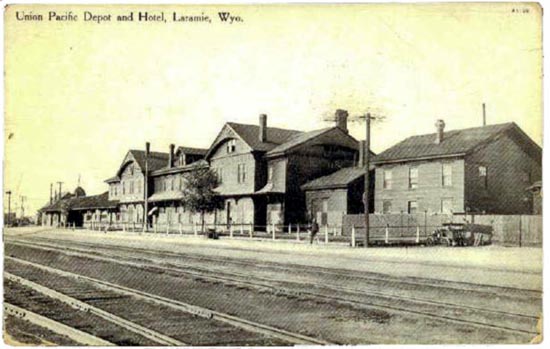
Union Pacific Hotel and Depot, Laramie.
With the coming of the railroad, Laramie became a shipping point for northern Colorado. In 1876, a
road was constructed from Laramie through Woods Landing to Walden in the North Park section of
northern Colorado. Thereafter until completion of the Laramie, Hahn's Peak and Pacific Railway
in 1911, all supplies for North Park
were brought in by double and triple wagons pulled by 12 or 14 horse teams.
Notwithstanding the road, Walden, in part due to its isolation, remained small. In 1887, the entire town
turned out for a photo, 17 people, one dog, two flower pots, six buildings and the
town pump. The Feb. 7, 1907, issue of the Walden New Era paid a tribute to one of the stage drivers:
Sid Lawrence, who drives the Laramie end of the Laramie-Walden stage line,
making the trip from Laramie to Wood's Landing,
a distance of 27 miles, and return has been on the route for thirteen years
straight. A record such as his needs no comment. A man who can put in
thirteen years in one position, and especially that of driving a stage
through all kinds of weather across the Laramie plains, where the wind
blows 400 days out of the year, sometimes with a speed and force that turns
over wagons, miles of barbed wire fence, etc. is deserving of more credit
than a pen is sufficiently eloquent to portray.
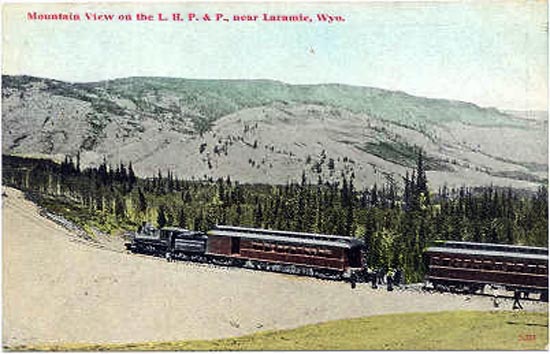
Excursion Train, Laramie, Hahn's Peak and Pacific Railway.
On October 17, 1911, the first train on the
L.H.P. & P., known by locals as
the "Long Hard Pull and Perhaps," reached Walden from Laramie. According to
Scott Thybony, Robert G. Rosenberg, and Elizabeth Mullett Rosenberg in The Medicin Bows: Wyoming's Mountain Country ,
Caxton Press, Caldwell, Idaho,(1985), the railroad was also referred to as
the "Late, Hard Pressed & Panicky" and the "Lord, Help Push and Pull."
In the 1930's the line
was absorbed by the UPRR, later to be spun off as part of the Wyoming-Colorado. Service
has now been discontinued, the tracks pulled up and the rolling stock sold to
a line in Arizona.
But the Laramie, Hahns Peak and Pacific Railway was not the first effort to bring a railroad which would
connect Laramie directly to Colorado. On May 1, 1880, the Union Pacific organized the
Laramie, North Park & Pacific Railroad and Telegraph Company. The line initially ran a
spur line 12 miles southwest from Laramie to four soda lakes which the company had acquired. Some preliminary surveys were
made of a proposed route to North Park. The processing of soda from the lakes, however, proved to be
a failure and the line was abandoned about 1900.
As later discussed, in 1901 Boston financier Isaac Van Horn and Fred A. Miller organized the Laramie,
Hahn's Peak & Pacific Railway. Financing was slow and it took until 1907 to reach Centennial. Original plans called for the
next extension to Encampment, but another railroad beat them to the punch. Instead the LHP&P extended down to Walden.
In 1906, Laramie business men organized the Denver, Laramie and
Northwestern Railway which was to run from Denver to Fort Collins and on to Laramie with the
ultimate intention to reach Seattle. Like most railroads of the day it was dependent upon
land sales for financing. Its land company the Denver, Laramie Realty Company promoted various
agricultural and coal towns that it proposed to form along the projected route. Agricultural towns were
promoted among other places at the Chicago Agricultural Show.

Kent, a new coal town along the route of the Denver, Laramie and Northwestern.
In 1909, construction started near the present location of the I-70 - I-25 Interchange in Denver. Grading
crews began laying out the route, including the construction of a tunnel near Virginia Dale. Sought for investments
in towns along the projected route never materialized. The road never reached Laramie. But for that
matter it never reached Fort Collins. Instead, in an effort to save the investments, a spur line was
constructed to Greeley. By 1917, the company was bankrupt and its assets were sold to a
Denver junk dealer.
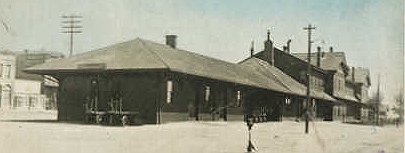
Union Pacific Depot and Hotel, 1910
The depot depicted above and at the end of the street in the
panoramic photo next page burned in 1917. See next photo. The current depot was
built in 1923.
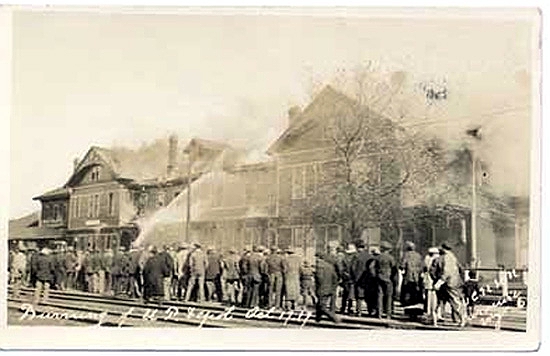
Depot fire, October 17, 1917, Photo by Henning Svenson
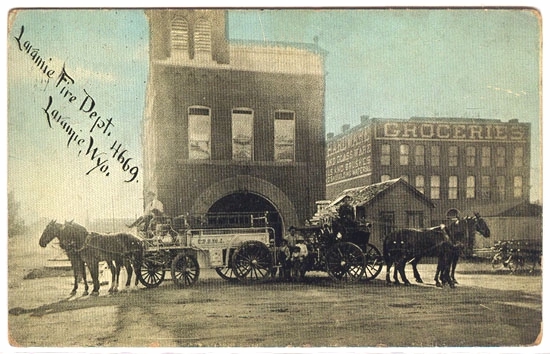
Laramie Fire Department, corner of 3rd and Custer, approx. 1911
After fires in 1871 and a fire at the Territorial Prison in 1872, the Laramie Fire
Department was formally organized in August of 1875 with the initial firehouse located at what is
now the corner of 3rd and Custer. The three story building in the background is the
Holladay Building which burned in 1948.
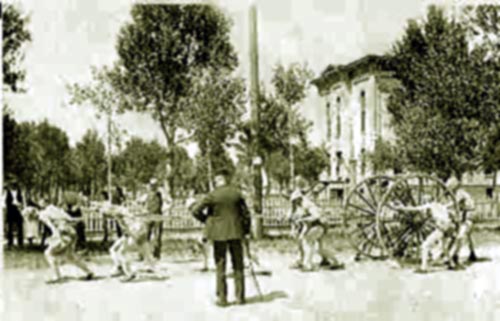
Laramie Hose Company, approx. 1911.
The building in the background is the Albany County Courthouse.
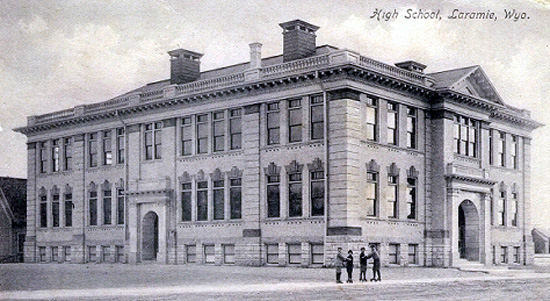
Laramie High School, 1914
In 1887 Laramie was designated as the home of the University of Wyoming. See pictures next page. By 1895 Laramie had attained
a population of over 6,000. Notwithstanding the University, Albany County remained a bit wild. In 1909, the Sheriff, Alfred H. Bath,
was killed near Woods Landing. His killer, George H. Sommers, was never caught.
Laramie Photos continued on next page.
|